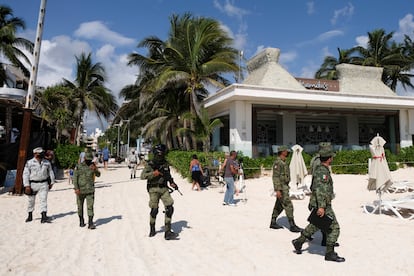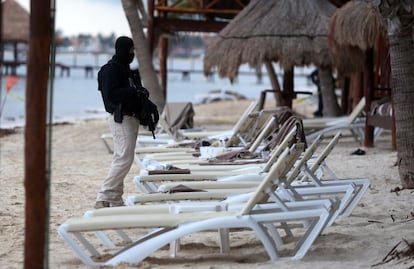Shootouts and murdered tourists: Why the FBI has set its sights on the Mexican paradise of Quintana Roo
The recent string of killings in the Caribbean has sounded alarm bells in the US, where authorities have issued new travel alerts for “violence and criminal activity”


It’s been hard for them to admit it, but the Mexican authorities are already speaking openly about the ever-greater presence of organized crime in Quintana Roo. The heart of the Mexican Caribbean has, since last year, been racking up a string of incidents that bear the hallmarks of drug gangs: killings, shootings, and bodies left on the street as a message.
Just in Playa del Carmen, a fishing village that has become a city-resort, there were recently two murders with the same pattern in the space of a week. Given that it is a destination for large numbers of US tourists, alarms have begun ringing for the US authorities. The FBI has taken steps given the situation, as Mexican President Andrés Manuel López Obrador made clear on Friday. He called on transparency from the US ambassador in the country, Ken Salazar.
The Friday before, two Canadian tourists were shot dead in Hotel Xcaret, the famous theme park on the Mexican Rivera Maya, not far from Playa del Carmen. Five days later, last Wednesday, the manager of another business, the Mamitas Beach Club – barely 15 minutes away by car – was found in the bathrooms of his establishment with two shots to the head. The state attorney, Oscar Montes de Oca, has confirmed that these incidents are related to drug trafficking.
The two incidents, which come on the heels of a long list of crimes over the last year, have led to the intervention of the FBI in this location, which is the jewel in the crown of the Mexican tourist sector, with more than 12 million visitors a year – nearly half of them from the United States.
“The FBI has just been involved in a matter in Quintana Roo and we are calling on the ambassador of the United States to report to us about this participation – if there was a report, if there was cooperation in line with the rules,” stated López Obrador during his morning press conference in the National Palace on Friday.
The message of the Mexican president comes in the context of the new status of US agencies in their southern neighbor. In December 2020, shortly before US President Joe Biden took office, López Obrador took swift action to change the national security law to put an end to the activities of foreign agents within the country’s borders. The move had a clear target: the United States and its police and intelligence agencies, which have been operating with ease in the entire Mexican territory for more than a decade and that have worked to arrest and extradite dozens of criminals, some of the stature of the infamous “El Chapo,” or Joaquín Archivaldo Guzmán Loera, to give the now-incarcerated drug lord his full name.
The spark that prompted this change in policy was the national embarrassment over the arrest of General Salvador Cienfuegos. The head of the Armed Forces during the government of Enrique Peña Nieto (2012-2018) was captured and accused by the US authorities of being at the service of a cartel without having informed any Mexican authorities about any investigation. With the reform to the law, Mexico was seeking to impose strict controls on agencies such as the Drug Enforcement Agency (DEA) and FBI or of any foreign power charged with police work within Mexican territory.

The growth of the violence in Quintana Roo has also prompted a rise in warning messages from the US authorities to its citizens about travel to the Mexican Caribbean. “Criminal activity and violence may occur throughout the state, including areas frequented by US citizen visitors,” reads the emergency alert warning for American citizens from the State Department. The US consulate in Mérida, the capital of the neighboring state of Yucatán, once again underlined the security alert this week, “in light of recent security incidents and criminal activity in popular tourist destinations including Cancun, Playa Del Carmen, and Tulum [...].”
The blows from organized crime in the Mexican Caribbean have been a constant in recent months. At the start of November last year, an armed group burst into another exclusive hotel nearby and killed two people in the reception. The sight of 15 men carrying heavy weapons, and prompting terror among the tourists, left no alternative. The authorities had to admit the obvious: this was a clash between rival drug gangs.
That same week, the bound body of a man was left in a park in Cancún. A month before, in October, a stray bullet in a restaurant in Tulum – another of the most popular destinations – killed an Indian and a German tourist, as well as injuring another three diners. In September, a taxi driver and a security guard were killed in another shooting in the area. And in August, a man died after being shot in the back of the head, also in Tulum.
According to the latest Envipe survey about the public perception of safety in the country, used as one of the official thermometers on violence in the country, eight out of 10 inhabitants of Quintana Roo feel unsafe.
Tu suscripción se está usando en otro dispositivo
¿Quieres añadir otro usuario a tu suscripción?
Si continúas leyendo en este dispositivo, no se podrá leer en el otro.
FlechaTu suscripción se está usando en otro dispositivo y solo puedes acceder a EL PAÍS desde un dispositivo a la vez.
Si quieres compartir tu cuenta, cambia tu suscripción a la modalidad Premium, así podrás añadir otro usuario. Cada uno accederá con su propia cuenta de email, lo que os permitirá personalizar vuestra experiencia en EL PAÍS.
¿Tienes una suscripción de empresa? Accede aquí para contratar más cuentas.
En el caso de no saber quién está usando tu cuenta, te recomendamos cambiar tu contraseña aquí.
Si decides continuar compartiendo tu cuenta, este mensaje se mostrará en tu dispositivo y en el de la otra persona que está usando tu cuenta de forma indefinida, afectando a tu experiencia de lectura. Puedes consultar aquí los términos y condiciones de la suscripción digital.








































